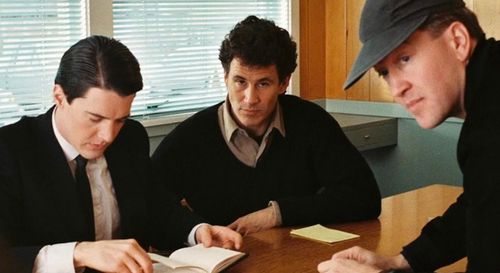CiNEMERCATOR - David Lynch TWIN PEAKS P I L O T 1989

Filmlover,
4 cinephiles:
Merthe Voorhoeve, Andreas van Riet,
Maaike Hasselaar & Elisabeth van Vliet,
each are programming 1 precious film per month. That's 4 precious films per month!
=
CiNEMERCATOR
doors open 19:30
start 20:00
ticket 3 Euro
nxt edition:
12-11
The pilot of Twin Peaks arrives like a dream you half-remember; familiar in its small-town quiet, uncanny in every shadow. What begins with the devastating discovery of a body becomes something stranger and subtler. Grief ripples through a town already trembling from secrets. David Lynch and Mark Frost let silence do the heavy lifting. Characters speak in hesitations and glances, rooms breathe. The camera lingers just a second longer than comfort allows, as if the town itself is watching. At the center is Agent Dale Cooper, whose gentle curiosity and reverence for intuition land like a blessing on a place teetering between the ordinary and the mystical. Laura Palmer, though absent, haunts every frame as a cipher of innocence, performance and unspoken darkness. Nothing resolves. Instead the episode plants seeds: quiet dread, crooked humor, tenderness in odd corners. It doesn’t rush to explain itself, trusting the viewer to sit in the atmosphere the way one sits in fog; patient, alert and slightly enchanted. The pilot doesn’t just introduce a mystery, it introduces a feeling. That ache of beauty brushing up against rot. It promises not answers but immersion and it keeps that promise. The pilot of Twin Peaks did more than announce a series, it altered the trajectory of David Lynch’s career and shifted the possibilities of television itself. Lynch was already a respected cinematic eccentric; the surrealist outsider with an Oscar nomination (The Elephant Man), a cult nightmare under his belt (Eraserhead), and a misunderstood studio experiment (Dune). But the series’ debut marked a startling migration: an auteur stepping into the realm of network TV without diluting his sensibility. Instead of being reshaped by television, Lynch reshaped television around him. The show’s early success opened space for his vision to roam more freely. His reputation expanded from that of a brilliant oddity to a cultural architect, someone who could fold melodrama into horror, comedy into dread and make the mundane vibrate with the cosmic. Without Twin Peaks Lynch's Lost Highway, Mulholland Drive and Inland Empire would almost certainly have been received- or even conceived differently, the series fortified his confidence in marrying the dreamlike with the everyday, in trusting mood over clarity and mystery over solution. As for its cult status now: Twin Peaks exists in a strange, elevated orbit. It is no longer simply a show; it is a touchstone, a mood, a lexicon. Its influence is visible everywhere; in prestige television’s long takes and uncanny pauses, in the resurgence of slow-burn mystery, in the acceptance and even celebration of narrative ambiguity. Modern audiences don’t just watch Twin Peaks; they inherit it, like folklore. What could have remained a curious early-’90s anomaly has instead become a living myth. And the pilot, with its trembling stillness and unnameable sadness, remains the doorway, the moment when television cracked open, and something dreamlike slipped through...
This film is chosen by Andreas.
🎂
Do you want to receive our